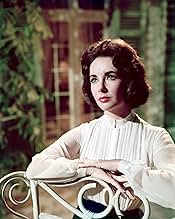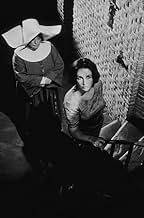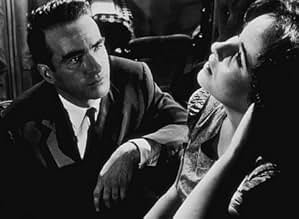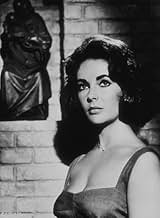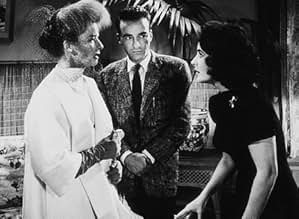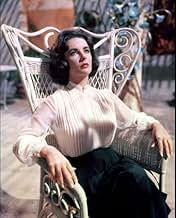IMDb RATING
7.5/10
18K
YOUR RATING
A surgeon is assigned the case of a young woman whose aunt wants her lobotomized to cover up a family secret.A surgeon is assigned the case of a young woman whose aunt wants her lobotomized to cover up a family secret.A surgeon is assigned the case of a young woman whose aunt wants her lobotomized to cover up a family secret.
- Nominated for 3 Oscars
- 4 wins & 7 nominations total
Sheila Robins
- Dr. Hockstader's Secretary
- (as Sheila Robbins)
Erik Chitty
- Asylum Inmate
- (uncredited)
Grace Denbeigh-Russell
- Asylum patient
- (uncredited)
Brenda Dunrich
- Nurse
- (uncredited)
Eddie Fisher
- Street Urchin
- (uncredited)
Anthony Lang
- Inmate
- (uncredited)
Aileen Lewis
- Nurse
- (uncredited)
Featured reviews
Film versions of Tennessee Williams great plays can be a little frustrating, especially for those of us lucky enough to have seen a fine production of the play on stage. I saw a fine production of this piece in London in 1999, with Sheila Gish as Mrs Venable, Rachel Weisz as Catherine and Gerard Butler as Doctor Cukrowicz.
But this film version is actually extremely good. The cast more or less speaks for itself. Katherine Hepburn is not quite as repulsive as I imagine Mrs Venable to have become, but this is a movie version after all and somehow Katherine Hepburn seemed to become increasingly ghastly as the movie goes on - strong work on her part and the Director's part I shouldn't wonder. Taylor and Clift are predictably good.
Most Tennessee William's plays had their endings tampered with for Hollywood and this piece is no exception. However, there is only a subtle difference between the ending of the film and the ending of the play, unlike the cringe-inducing changes to some ("Streetcar" and "Cat" being the main offenders).
This is not William's best-known piece, but it is one of my favourites and this film version also slots in right up there with the very, very best.
Well worth seeing, is this.
But this film version is actually extremely good. The cast more or less speaks for itself. Katherine Hepburn is not quite as repulsive as I imagine Mrs Venable to have become, but this is a movie version after all and somehow Katherine Hepburn seemed to become increasingly ghastly as the movie goes on - strong work on her part and the Director's part I shouldn't wonder. Taylor and Clift are predictably good.
Most Tennessee William's plays had their endings tampered with for Hollywood and this piece is no exception. However, there is only a subtle difference between the ending of the film and the ending of the play, unlike the cringe-inducing changes to some ("Streetcar" and "Cat" being the main offenders).
This is not William's best-known piece, but it is one of my favourites and this film version also slots in right up there with the very, very best.
Well worth seeing, is this.
In 1930's New Orleans, a wealthy and eccentric older woman named Mrs. Venable (Katharine Hepburn), wants a surgeon (Montgomery Clift) to perform a lobotomy on her niece (Elizabeth Taylor), for reasons that become clear toward the end of the film. This macabre Tennessee Williams story, with overlapping adult themes, must surely have been a shock to audiences in 1959. The film provides a great vehicle for the talents of both Hepburn whose acting is engaging, and Taylor whose performance is superb.
The Mankiewicz script is very talky. The characters of both Hepburn and Taylor engage in lengthy and at times tedious monologues. In all that talking, at least there are some really good lines. My favorite is near the beginning. In a nonchalant tone, Mrs. Venable tells us about the daily vicissitudes of Lady, the Venus flytrap that Mrs. Venable keeps in her garden. "Lady must be kept under glass, and while she is under glass, we have to provide her with flies, flown in at great expense." Priceless.
As one would expect for a film derived from a stage play, cinematography and music are less important than dialogue and acting. "Suddenly Last Summer" is worth viewing for its unusual story, and for the acting accomplishments of Hepburn and Taylor.
The Mankiewicz script is very talky. The characters of both Hepburn and Taylor engage in lengthy and at times tedious monologues. In all that talking, at least there are some really good lines. My favorite is near the beginning. In a nonchalant tone, Mrs. Venable tells us about the daily vicissitudes of Lady, the Venus flytrap that Mrs. Venable keeps in her garden. "Lady must be kept under glass, and while she is under glass, we have to provide her with flies, flown in at great expense." Priceless.
As one would expect for a film derived from a stage play, cinematography and music are less important than dialogue and acting. "Suddenly Last Summer" is worth viewing for its unusual story, and for the acting accomplishments of Hepburn and Taylor.
Katharine Hepburn is a wealthy woman who uses her checkbook in the hopes of having her niece lobotomized in "Suddenly, Last Summer," a 1959 film directed by Joseph Mankiewicz and starring Elizabeth Taylor, Katharine Hepburn, Montgomery Clift, and Mercedes McCambridge.
Hepburn plays Mrs. Venable, whose son, Sebastian, died the previous summer of a heart attack. However, her niece Cathy, who accompanied Sebastian, has had a sort of breakdown and is institutionalized.
Mrs. Venable wants Cathy lobotomized. Before doing so, however, the gifted surgeon (Clift), sent there by his boss as Mrs. Venable dangles money for the hospital in front of him, becomes determined instead to find out what happened and how Sebastian really died.
This is a film that would never be made today - it's character-driven and has too much dialogue. It's a shame because the dialogue is excellent. A previous Mankiewicz film, "All About Eve," is word-rich as well, and there the dialogue sparkles. Here it is more poetic. And, like "Eve," the great roles are the womens.
Though references to homosexuality are only inferred, this film and the much more poorly adapted "Cat on a Hot Tin Roof" hold up very well today. With homosexuality much more discussed, the role this plays in both plots is very obvious, at least to this viewer.
In "Suddenly, Last Summer," Sebastian's proclivities are evident from the beginning as Mrs. Venable describes an almost husband-wife relationship with her son, claiming to the surgeon that Sebastian was "chaste" and that her relationship with him was enough for her son.
One of the comments here mentioned that "Cathy is crazy, like all Williams heroines." But in truth, Cathy like Blanche is disturbed (though Blanche may be a little closer to being nuts) and both are "put away" to shut them up - Blanche for her accusations against Stanley and Cathy because she knows how Sebastian really died.
Katharine Hepburn gives a brilliant performance as Mrs. Venable - charming but made of steel, her anger and jealousy toward her niece just barely beneath the surface.
Elizabeth Taylor gives one of her best performances under the strong direction of Mankiewicz. Taylor was blessed with great beauty but alas, not a great speaking voice. However, she is nevertheless very effective, particularly in her long, harrowing monologue near the end of the film.
Clift's passive portrayal of the surgeon is problematic, and one wonders why he was cast. The opening scene in which he performs an operation had to be redone many times because of his drunkenness and codeine addiction - he was washing down the pills with brandy; his voice quavers, he is unsteady on his feet, and his eyes are glassy.
He comes off a little better in the previous year's "Lonelyhearts," though in that film, he actually winces in pain when he has to sit. While Clift had the support of his fellow actors, he had none from Mankiewicz and producer Sam Spiegel.
Had it not been for Elizabeth Taylor's insistence, he would have been replaced. It seems cruel (as it did to Hepburn at the time) but Mankiewicz was trying to make a movie and Spiegel wanted it to be on budget - Clift's addictions and physical problems weren't helping. He couldn't remember lines; when he finally said them, he was often inaudible; and he was always late arriving on the set.
Fortunately for audiences, this wasn't his last big-budget role. Under the direction of Elia Kazan, he would do the magnificent "Wild River" and seemingly be more in control.
Despite this, "Suddenly, Last Summer" is an excellent, disturbing film, and is highly recommended. It's not Williams' best play, but it is served well in its film adaptation.
Hepburn plays Mrs. Venable, whose son, Sebastian, died the previous summer of a heart attack. However, her niece Cathy, who accompanied Sebastian, has had a sort of breakdown and is institutionalized.
Mrs. Venable wants Cathy lobotomized. Before doing so, however, the gifted surgeon (Clift), sent there by his boss as Mrs. Venable dangles money for the hospital in front of him, becomes determined instead to find out what happened and how Sebastian really died.
This is a film that would never be made today - it's character-driven and has too much dialogue. It's a shame because the dialogue is excellent. A previous Mankiewicz film, "All About Eve," is word-rich as well, and there the dialogue sparkles. Here it is more poetic. And, like "Eve," the great roles are the womens.
Though references to homosexuality are only inferred, this film and the much more poorly adapted "Cat on a Hot Tin Roof" hold up very well today. With homosexuality much more discussed, the role this plays in both plots is very obvious, at least to this viewer.
In "Suddenly, Last Summer," Sebastian's proclivities are evident from the beginning as Mrs. Venable describes an almost husband-wife relationship with her son, claiming to the surgeon that Sebastian was "chaste" and that her relationship with him was enough for her son.
One of the comments here mentioned that "Cathy is crazy, like all Williams heroines." But in truth, Cathy like Blanche is disturbed (though Blanche may be a little closer to being nuts) and both are "put away" to shut them up - Blanche for her accusations against Stanley and Cathy because she knows how Sebastian really died.
Katharine Hepburn gives a brilliant performance as Mrs. Venable - charming but made of steel, her anger and jealousy toward her niece just barely beneath the surface.
Elizabeth Taylor gives one of her best performances under the strong direction of Mankiewicz. Taylor was blessed with great beauty but alas, not a great speaking voice. However, she is nevertheless very effective, particularly in her long, harrowing monologue near the end of the film.
Clift's passive portrayal of the surgeon is problematic, and one wonders why he was cast. The opening scene in which he performs an operation had to be redone many times because of his drunkenness and codeine addiction - he was washing down the pills with brandy; his voice quavers, he is unsteady on his feet, and his eyes are glassy.
He comes off a little better in the previous year's "Lonelyhearts," though in that film, he actually winces in pain when he has to sit. While Clift had the support of his fellow actors, he had none from Mankiewicz and producer Sam Spiegel.
Had it not been for Elizabeth Taylor's insistence, he would have been replaced. It seems cruel (as it did to Hepburn at the time) but Mankiewicz was trying to make a movie and Spiegel wanted it to be on budget - Clift's addictions and physical problems weren't helping. He couldn't remember lines; when he finally said them, he was often inaudible; and he was always late arriving on the set.
Fortunately for audiences, this wasn't his last big-budget role. Under the direction of Elia Kazan, he would do the magnificent "Wild River" and seemingly be more in control.
Despite this, "Suddenly, Last Summer" is an excellent, disturbing film, and is highly recommended. It's not Williams' best play, but it is served well in its film adaptation.
Superb acting by Katharine Hepburn, Elizabeth Taylor, and Montgomery Clift spark this nifty adaptation of Tennessee Williams' play. This Southern Gothic tale is worthy of Flannery O'Connor as it pits innocent Catherine against her aunt Violet as they battle over the memory and reality of Sebastian Venable.
With hints of incest and homosexuality along with family jealousies and squabbling, the women go at each other as they each go after the new doctor from Chicago (Clift). Violet wants the girl committed to an asylum where she will be given a lobotomy. The girl battles back as she recalls the real truth about Sebastian. Her greedy family (Mercedes McCambridge, Gary Raymond) are perfectly willing to sacrifice Catherine for a chunk of money. Everyone is a vulture in this story. The asylum is run by another greedy man (Albert Dekker) who only wants Venable money for a new hospital wing.
After Sebastian casts aside mother (Hepburn) for his summer trip and takes Catherine (Taylor), the older woman starts working to get her revenge. But when Sebastian dies, she goes into mourning as well. Complicated story of innuendo and symbol, one is never quite sure what happens to Sebastian who is symbolically eaten by the boys he has sexually preyed on (heavens to Michael Jackson!). But the sight of his death drives Catherine nuts. The mother of course is in denial of every unsavory trait Sebastian possessed.
Brilliant, florid dialog and two wonderful, long soliloquies by Hepburn and Taylor are highlights. The symbolism is fairly obvious but works well within the context of Southern Gothic. All the supporting cast is fine. Taylor and Hepburn earned best actress Oscar nominations. Gore Vidal, Tennessee Williams, and his partner, Frank Merlo, are in the opening surgery scene. A fascinating story and some great performances.
Special mention must be made of Gore Vidal's brilliant screenplay, expanding the one-act play by Tennessee Williams (who had nothing to do with the screenplay, despite his billing). Vidal perfectly captures the cadence of Williams' speeches and maintains the Gothic mystery Williams was trying for. Vidal lost his chance for an Oscar nomination after the film Catholic Church attacked the film his its implied (gasp!) tale of homosexuality.
With hints of incest and homosexuality along with family jealousies and squabbling, the women go at each other as they each go after the new doctor from Chicago (Clift). Violet wants the girl committed to an asylum where she will be given a lobotomy. The girl battles back as she recalls the real truth about Sebastian. Her greedy family (Mercedes McCambridge, Gary Raymond) are perfectly willing to sacrifice Catherine for a chunk of money. Everyone is a vulture in this story. The asylum is run by another greedy man (Albert Dekker) who only wants Venable money for a new hospital wing.
After Sebastian casts aside mother (Hepburn) for his summer trip and takes Catherine (Taylor), the older woman starts working to get her revenge. But when Sebastian dies, she goes into mourning as well. Complicated story of innuendo and symbol, one is never quite sure what happens to Sebastian who is symbolically eaten by the boys he has sexually preyed on (heavens to Michael Jackson!). But the sight of his death drives Catherine nuts. The mother of course is in denial of every unsavory trait Sebastian possessed.
Brilliant, florid dialog and two wonderful, long soliloquies by Hepburn and Taylor are highlights. The symbolism is fairly obvious but works well within the context of Southern Gothic. All the supporting cast is fine. Taylor and Hepburn earned best actress Oscar nominations. Gore Vidal, Tennessee Williams, and his partner, Frank Merlo, are in the opening surgery scene. A fascinating story and some great performances.
Special mention must be made of Gore Vidal's brilliant screenplay, expanding the one-act play by Tennessee Williams (who had nothing to do with the screenplay, despite his billing). Vidal perfectly captures the cadence of Williams' speeches and maintains the Gothic mystery Williams was trying for. Vidal lost his chance for an Oscar nomination after the film Catholic Church attacked the film his its implied (gasp!) tale of homosexuality.
"Suddenly, Last Summer" brought Elizabeth Taylor her third Oscar nomination, and she probably should have won (though winner Simone Signoret's performance in "Room at the Top" was also outstanding). Taylor is awesome in this film ----- most notably in the final twenty minutes, which she virtually dominates. This entire scene was reportedly shot in one take, which makes sense, since the character begins with a narrative and gradually builds to an emotionally shattering climax. Taylor's previous film, "Cat on a Hot Tin Roof", was also Oscar caliber, but this performance is even more impressive. The 1960 Oscar for "Butterfield 8" was probably a consolation prize for the Oscar she should have received for either of these two previous films.
Did you know
- TriviaAfter years of alcoholism and prescription drug abuse, Montgomery Clift was considered uninsurable due to chronic ill health. Ordinarily, he would have been fired and replaced, but his good friend Dame Elizabeth Taylor saved his job by insisting she would not do this movie without him.
- GoofsAlthough set in 1937, costumes, hairstyles and makeup worn by Dame Elizabeth Taylor are all contemporary in 1959.
- Quotes
Catherine Holly: Is that what love is? Using people? And maybe that's what hate is - not being able to use people.
- ConnectionsEdited into Michael Jackson's This Is It (2009)
Details
- Release date
- Countries of origin
- Language
- Also known as
- De repente en el verano
- Filming locations
- Begur, Girona, Catalonia, Spain(village and old castle scenes)
- Production companies
- See more company credits at IMDbPro
Box office
- Budget
- $3,000,000 (estimated)
- Gross worldwide
- $9,830
- Runtime
- 1h 54m(114 min)
- Color
- Aspect ratio
- 1.85 : 1
Contribute to this page
Suggest an edit or add missing content



